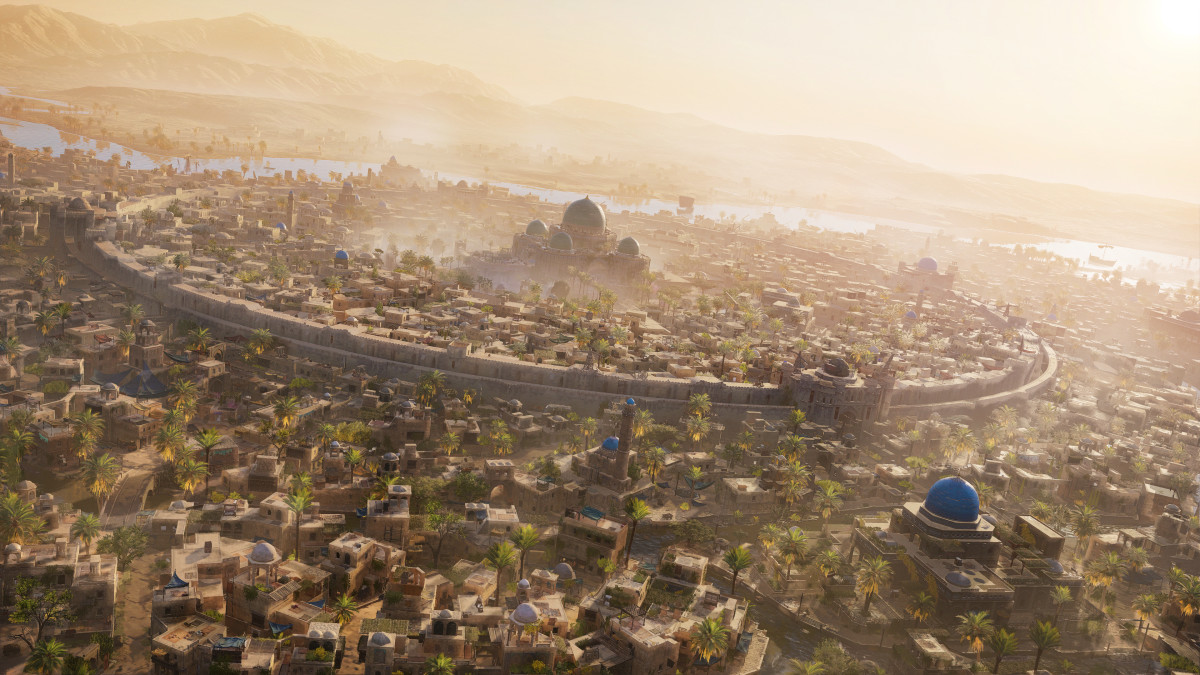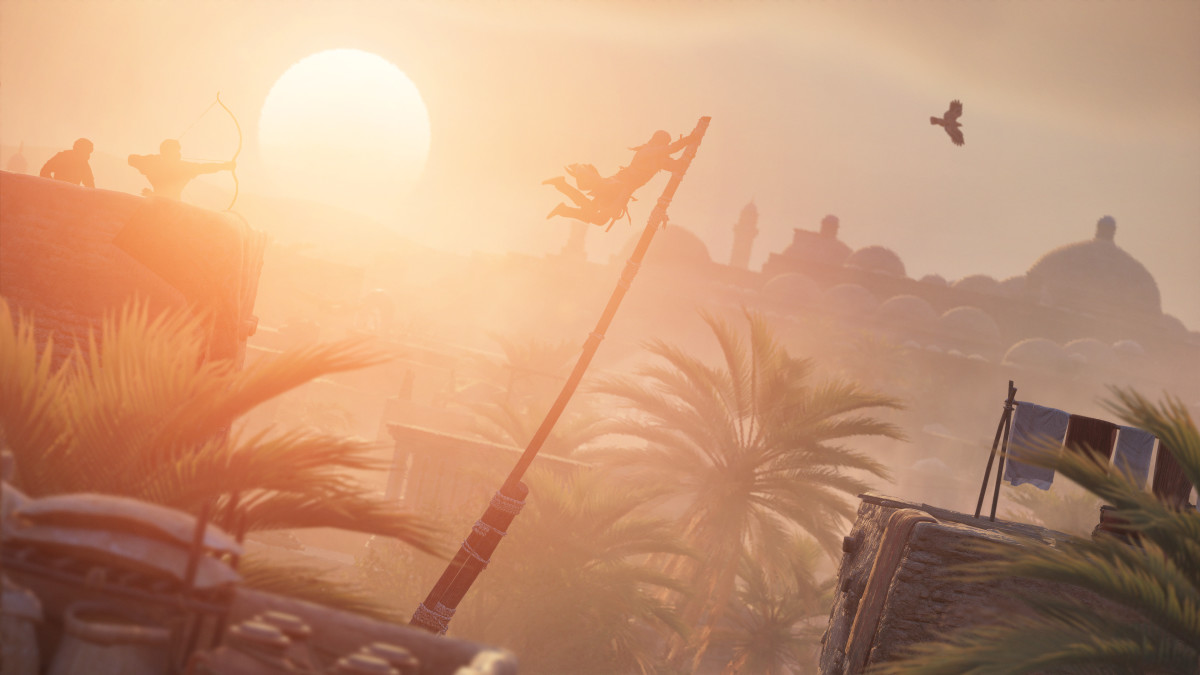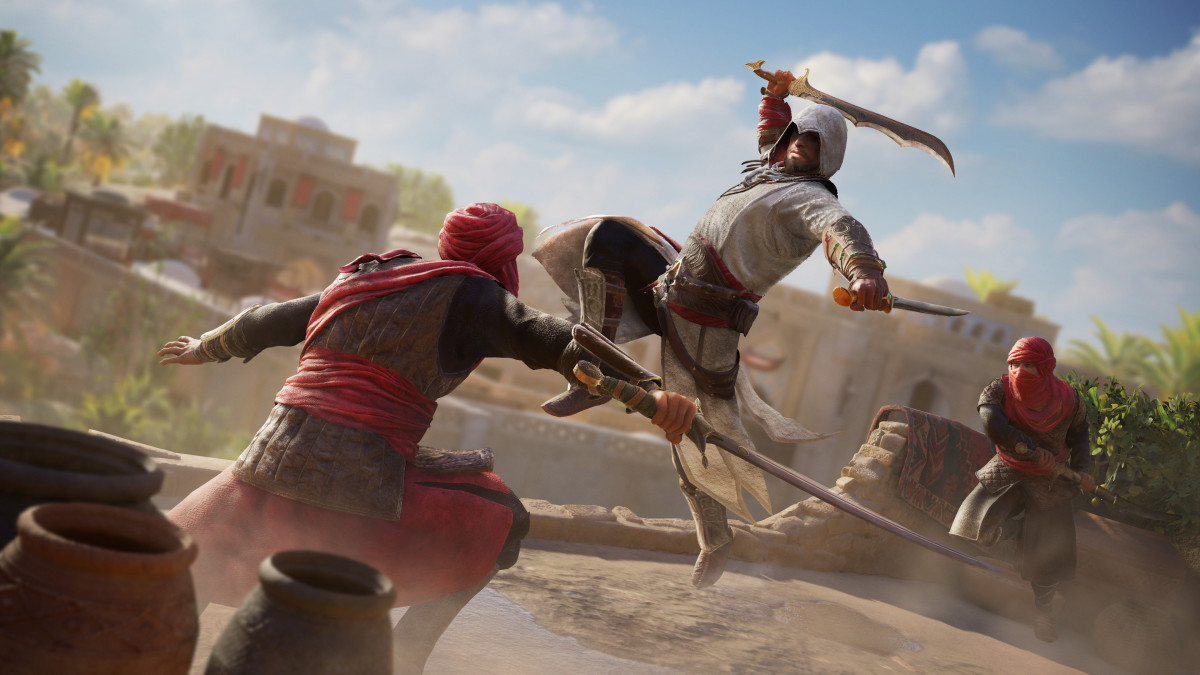Assassin’s Creed Mirage review: a gymnast from the past

There’s something about being in a city that still grabs you. Climbing a tall tower, perching at the top, and panning the camera around to take it all in – Assassin’s Creed feels at home on the rooftops, where it was born, and Assassin’s Creed Mirage’s Baghdad is one of the best urban sprawls Ubisoft has ever made.
The Round City is built like a fort, with its grand, domed palaces at the center, encircled by shells of sand-colored stone and manned checkpoints. It’s a city of poetry and art, where every interior is decorated with complex mosaic tiles and gardens are protected with lattice canopies interwoven with vibrant flowers, winding creepers, and green leaves. At the edge of the rings, where the poorer folk live, brickwork is mottled and dust from the surrounding desert chokes your lungs.
All of this is backed by a soundscape of donkeys, street merchants, and evening prayers, and there’s an eerie synth that bleeds in via the dynamic soundtrack, lending the city a distinct vibe.

You explore this place as Basim (played by Lee Majdoub), the bad guy of AC Valhalla. In this prequel, he’s young and starry-eyed, fuelled by a strong sense of justice and keen to enter the ranks of the Hidden Ones. After a series of robberies as a street thief, he’s eventually taken in to train under the wing of Roshan (played by Shohreh Aghdashloo), a master assassin who sounds as if she gargles on mouthwash made entirely of toads (complimentary).
It’s a typical setup for an AC game, but that’s what AC Mirage is – typical. While there’s a certain amount of novelty to taking the series back to its roots – where stealth and assassinations reign supreme and damage numbers don’t exist – it does highlight a glaring lack of progress. Basim might be one of the most interesting characters in the series, but this is a hero’s journey (derogatory), and while the end hints at what he’ll eventually become, it could have been far more daring than what we got.
This goes for the mechanics, too. Sure, there are a few new wrinkles – pole vaulting between buildings and a mark-and-execute move where you can tag and kill a group of enemies in a flash – but you still feel like the clumsiest assassin to ever don a hood. It reads your intent inconsistently as you hold a button down and bound across rooftops. You often find yourself scrambling up the wrong wall or jumping off and landing right in front of an enemy at the worst possible moment. When you fail, it rarely feels like it was your fault. When you do something cool, it’s almost always the game playing itself.

It also feels slow for a game about parkour – it has none of the sense of speed and momentum of something like Mirror’s Edge. This isn’t helped by the fact you never feel in danger once you’re above the city streets – losing a pursuer is as easy as a kid playing hopscotch. I was never a fan of Assassin’s Creed Unity, but I could at least appreciate how much that evolved the parkour. This steps it right back to Assassin’s Creed 2.
Ubisoft needs to invest in the tech powering this series. I remember playing Splinter Cell: Chaos Theory back in the day and marveling at how heavy it felt. You’d palm strike a man in the face and he’d topple over a railing before thudding into the floor. Mirage focuses instead on canned animations, and the subpar physics only kicks in when a person dies. This means you often assassinate someone who’s on the edge of a building, they fall flat to the floor, where they float over the edge, completely ridgid, before falling to the ground in that same position.
One area that has improved is the mission design. There are a few tailing missions but they’re not overdone. I appreciate how some missions trust you to find a location by giving you a series of clues and letting you figure it out on your own, which is a huge improvement over the many map markers of the older AC games.

It also features the best combat in an Assassin’s Creed game, which, admittedly, isn’t a high bar. Basim fights with a dagger in his offhand, which he uses to parry. You can also dodge, slash, heavy slash, and use a range of gadgets. Incoming attacks in this series have been hard to read for a while now, but Mirage makes the rules clear and allows you to carve through swathes of enemies if your skills are up to the task. The only thing stopping you are the harder enemies who turn up when you cause too much ruckus.
I also appreciate the more open nature of the assassination missions, which take a Hitman-esque (though nowhere near as complex or clever) approach, allowing you to come at a target from a variety of different ways. Get into the correct position at the end and you can pull off a signature kill, which is way cooler than accidentally landing in front of your target before stabbing them and running away (which I definitely didn’t do, OK?). I mean, I am playing as a guy who wears his secret organization’s logo in a big medallion dangled over his shoulder – he’s a moron. To be fair to him, though: if history has taught us anything, it’s that people love good branding.
As for the historical period the game is depicting, Ubisoft has done an amazing job of delving into the culture of Iraq. There are so many codex entries where you can learn about the law, how it was governed, how taxation worked, and more. Arabic culture is treated with real reverence, to the point where even some of the game’s achievements are written in the language.

I do think there’s a missed opportunity here, however. At certain points, characters switch to their native tongue for key phrases such as greetings and prayers, which are then translated to English in a subtitle, but Ubisoft chickens out when you’re charging in with rebels who are shouting “God is great”, which they do in English. This could have been a good opportunity to demystify a pious phrase that’s been vilified in other media.
It feels like that for a lot of Mirage. Almost every part of the game I enjoy has some other part that I truly dislike. Take those open levels – good in themselves, but poor in how they’re implemented. To stop you from just finding the target and getting out, almost every location has some kind of locked door that bars your progress. Every single mission grinds to a halt, and you end up running around the building trying to find a window, a keyholder, or some shelf to budge out of the way. It’s not so bad the first few times, but it starts getting a little old when you hit the ten-hour point. It became so irritating that I started to clear out every guard from a compound instead of sneaking in because that way I could run around freely to find the route inside the locked room. Just like kicking off a wall and landing on top of a guard’s head, it’s a complete momentum killer.

I hope Ubisoft continues to make city-based Assassin’s Creed games because it’s refreshing to play something this tight and focused after the more bloated, RPG-focused AC games, but the developers need to update it for modern tastes. From the tech powering it to the structure and base mechanics, I’d love to see where the series could go with a proper overhaul. I’m not asking for a completely different game, but the physics and parkour controls feel drastically dated, and it’d be nice if they could find a way to let us infiltrate buildings beyond making us search for keys like it’s Doom.
Of course, Ubisoft never said this would reinvent the Hidden Blade. Mirage is launching at $49.99 – well below the asking price of most modern triple-A games, marking it out as an experimental side project. With that taken into account, it’s easier to recommend. If you’re pining for a game exactly like the Assassin’s Creed games of old, Mirage is exactly what you’ve been waiting for, warts and all. If you’re looking for an evolution to the parkour, city-focused AC games, you’ll likely be disappointed.
Score: 7/10
- Visuals 7/10
- Story 6/10
- Mechanics 7/10
- Sound 8/10
Version tested: PS5
The Arena Media Brands, LLC and its partners may receive compensation for links to products and services on this website.
You can pre-order Assassin’s Creed Mirage on Amazon and get it in time for tomorrow’s launch.
